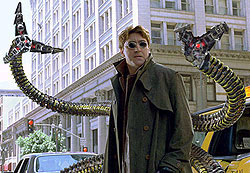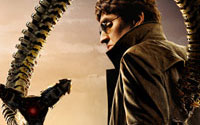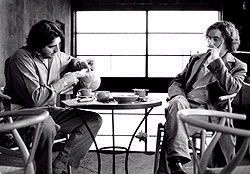 Alfred Molina ('Spider-Man 2')
Alfred Molina ('Spider-Man 2')
'Surfing The Web'
Alfred Molina was born in 1953, in London, UK, of a Spanish father and an Italian mother. He studied at the Guildhall School of Music and Drama, London. His stage work includes two major Royal National Theatre productions, Tennessee Williams' "The Night of the Iguana" (as Shannon) and David Mamet's "Speed the Plow" (as Fox), plus a splendid performance in Yasmina Reza's "Art" (his Broadway debut), for which he received a Tony Award nomination in 1998.
He made his film debut in 'Raiders of the Lost Ark' (1981) and got a good part in 'Letter to Brezhnev' (1985) (as a Soviet sailor who spends a night at Liverpool), but his movie breakthrough came two years later when he played - superbly - Kenneth Halliwell, the tragic lover of Joe Orton, in Stephen Frears' 'Prick Up Your Ears' (1987). He since also appeared in 'Enchanted April' (1992), 'The Perez Family' (1995), 'Chocolat' (2000), 'Frida' (2002), 'Identity' (2003) and TVs 'The Ladies Man'.
Most recently, Molina has returned to Broadway playing the lead role in "Fiddler on the Roof", but on June 30th, Molina will be seen by millions of moviegoers as he takes on the role of Dr. Otto Octavius AKA Doc Ock in the sequel to the mega-blockbuster, 'Spider-Man'.
How did you go from doing 'Spider-Man 2' to starring in "The Fiddler on the Roof" on Broadway? "I've always done theatre. I've been acting professionally now for over thirty years and I've always managed to keep a nice mix of theatre and film. Doing "Fiddler" was just part of that strategy, to make sure that I wasn't away from theatre for too long. It's those kind of sharp turns and changes of gear that keeps you interested and keeps the creative juices flowing."
"If I had wanted to, I could have very easily segued into another big blockbuster movie, and done another bad guy and sat around making loads of money, but I've always been terrified of being bored. I always think that being bored is the worst thing. The only strategic decision I ever made as an actor was to try and make each job as different as possible from the last one. After 'Spider-Man', I knew that I wanted to do some theatre, and I thought what's the most different thing I can do? And "Fiddler" seemed like it. You couldn't have much more of a gear change."
 Is it challenging to go from a big budget special effects movie like 'Spider-Man 2' to doing a Broadway musical? "The work is essentially the same. It's a different set of circumstance, a different media and discipline, but it's a bit like being a plumber. One day you're putting in one of those real fancy schmancy shower units, and the next day you've got your hand down a toilet clearing out sh*t. It's the same job, and the tools are coming out of the same box. The circumstances are different, but the job-acting, entertaining-is essentially the same. It's bringing yourself to something and hopefully, giving people as pleasant an experience as possible."
Is it challenging to go from a big budget special effects movie like 'Spider-Man 2' to doing a Broadway musical? "The work is essentially the same. It's a different set of circumstance, a different media and discipline, but it's a bit like being a plumber. One day you're putting in one of those real fancy schmancy shower units, and the next day you've got your hand down a toilet clearing out sh*t. It's the same job, and the tools are coming out of the same box. The circumstances are different, but the job-acting, entertaining-is essentially the same. It's bringing yourself to something and hopefully, giving people as pleasant an experience as possible."
So how does it feel to be playing Doctor Octopus, such a popular 'Spider-Man' villain? "I'm aware of how important he is in the iconography of that particular universe. I've spoken to a lot of fans of the 'Spider-Man' comics, and they say that he's revered as a character, because he's such a famous villain. I was always aware that there was a great deal of expectation awaiting this movie, and as with every transfer from one media to another, when you make a movie version of anything whether it's a comic book or a play, you can't be concerned about just making a direct copy of that original thing. You have to change it somewhat. You have to make it new. Doc Ock in our movie doesn't look the same as the Doc Ock in the comic book. And if you want to know how, you're just going to have to put down your ten bucks and find out."
Do you know what of your past work made Sam Raimi think of you for this part? "I think Sam must have checked out a couple things. I wasn't the only actor who was seen for the role of Doc Ock. There was a whole bunch of us: me, Ed Harris, Chris Cooper, Chris Walken. We were all actors on a list, because we all had movies that made a bit of a splash. Chris had gotten the SAG and Oscar nomination; Ed Harris had gotten an Oscar nomination; I had just gotten a SAG and BAFTA nomination for 'Frida'. So we were just characters actors who were like in the mix at the time. I had three meetings with Sam Raimi for it."
So, do you like playing the bad guy in movies? "I was a villain in the first thing I ever did, 'Raiders of the Lost Ark'. When you're my size and look the way I do, romantic leads are not going to come your way. The great thing that has worked out really well was that playing the villain has allowed me to play some really interesting parts. I have no worries about being typecast as the bad guy, because it's a very noble profession."
Are there a lot of differences between working on a movie like 'Spider-Man 2' and doing something like Jarmuch's latest, 'Coffee & Cigarettes' of which you also feature in? "Financially, there's a big difference, but from a creative point of view as well. As a general rule, the cheaper the movie, the more creative the experience. That is not to denigrate expensive movies, because I don't want to be seen as biting the hand that feeds me. With big movies where there are a lot of special effects, the role of the actor is somewhat diminished. You become part of a much bigger canvas, whereas on a smaller film, where there are budgetary restrictions, where there isn't money for a trailer or a craft service*, and everyone's pitching in, then that creates a very different kind of work environment, where people by definition have to be more creative to survive. You have to find more inventive and creative ways to do the same thing. Everyone's much more involved in the process."
 And talking of the new Jim Jarmuch movie, 'Coffee & Cigarettes', how did you end up working with Steve Coogan? Was that your suggestion to work with him? "No, that was all Jim's idea. He asked if I had heard of an English actor named Steve Coogan, and I said, "Absolutely, he's great!" And he told me he had been talking to him and was thinking of putting us together, because he thought we were different enough and the fact that we're both English might spark something. Which it did, so he was absolutely right. He cast it very well. I didn't know Steve personally, but I knew his work from England, because he's very famous and popular for a whole series of characters, one of the most famous being a guy called Alan Partridge. All of his characters are wonderfully obnoxious, and he has this wonderful way of finding the one that you find excruciatingly funny but also slightly disgusting. There's great comic value in that. Whatever he introduced to the scene, I was happy to go along with, because his improvisational skills are phenomenal."
And talking of the new Jim Jarmuch movie, 'Coffee & Cigarettes', how did you end up working with Steve Coogan? Was that your suggestion to work with him? "No, that was all Jim's idea. He asked if I had heard of an English actor named Steve Coogan, and I said, "Absolutely, he's great!" And he told me he had been talking to him and was thinking of putting us together, because he thought we were different enough and the fact that we're both English might spark something. Which it did, so he was absolutely right. He cast it very well. I didn't know Steve personally, but I knew his work from England, because he's very famous and popular for a whole series of characters, one of the most famous being a guy called Alan Partridge. All of his characters are wonderfully obnoxious, and he has this wonderful way of finding the one that you find excruciatingly funny but also slightly disgusting. There's great comic value in that. Whatever he introduced to the scene, I was happy to go along with, because his improvisational skills are phenomenal."
Was a lot of that scene improvised or did you work off a script? "It's a bit of both really. I can't remember how it breaks down percentage wise. If I remember correctly, Jim wrote a basic outline for the scene and a basic story and some dialogue, and then Steve and I - in Steve's phrase - we "sliced it and diced it" and played around with it and added some things. There were elements in the scene that were truthful. All the stuff about me living in America, that's all true, and I threw in the gag about hiking, because I do go hiking. Jim didn't say to us, "I want you to be yourselves." He said, "I want you to play yourselves." That gave us the freedom to create characters that had elements of us, but elements that we were able to exaggerate."
Is that really what it's like when two well known actors meet for the first time? Is it always that awkward? "It's never happened to me, but I'm sure it might. There's always this assumption with celebrities or people who are prominent in the media or showbiz. Every time you see actors and actresses together, they're usually very close to each other, and everyone's smiling and laughing. It creates this image that all famous people know each other and are all terribly close friends. In fact, nothing could be further from the truth. I'm quite a gregarious person - I'm not out clubbin' or anything like that - but I socialize and I have a nice group of friends, but there are only two people, out of all the actors I've worked with, that I am really close friends with. That tends to be the case. There's a lot of what you might call professional socializing, because that's part of your working week. It's a kind of myth that we're all phoning each other up and sharing deep secrets and private things."
In the scene, a fan goes up to Steve and totally ignores you. Is that something that came from real life? "You always use whatever is going on or whatever experiences you have. All of your best stuff is going to come from stuff you know. If you're sitting there having coffee with someone who you imagine you're at the same level as them, either as far as profile or reputation or your standing in the industry. If you're sitting there as equals, as contemporaries or colleagues, and someone comes up and totally focuses on them and completely ignores you, of course, you're going to be gracious about it and flip it off as one of those things. At some level, you're thinking, "What am I? Chopped liver?" That's just a human reaction. If you're smart enough, you would just ignore it and let it go because it's meaningless, but you have to acknowledge that we all feel these things. If you're a performer than you use those human truths that we all experience and exploit them, because you know the audience is going to relate to it."
Whose decision was it for you to drink tea in your segment? "Jim just said "You know what? The coffee and cigarettes is just a circumstantial context for the stories. You can drink coffee or not. You can smoke or not. You can drink whatever you want, frankly." Steve and I decided that it might be a nice little detail if we drank tea, because one of the great jokes about Brits in Hollywood is that they're always bitching and moaning how they can't get a decent cup of tea. So we thought we'd drink tea as a nice little comic detail."
Had you already been cast in Spider-Man 2 when you filmed that piece with Coogan? "We shot this in end of January or beginning of February 2003, and then I was back in New York in April to shoot 'Spider-Man 2'. It was definitely in the works, but whether the offer had been made or not at that point, I'm not sure."
Back To Archives

